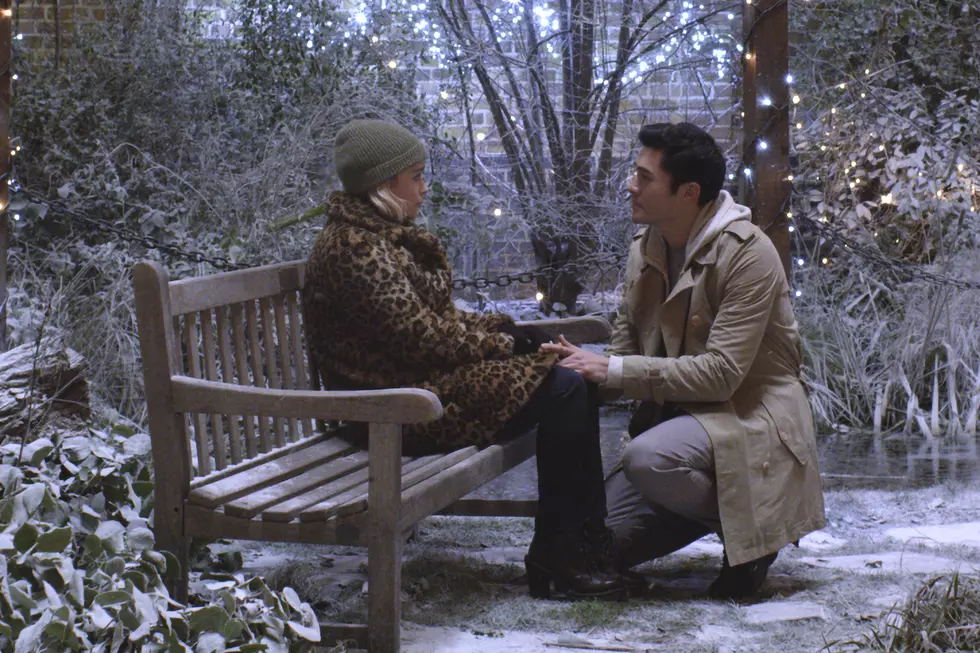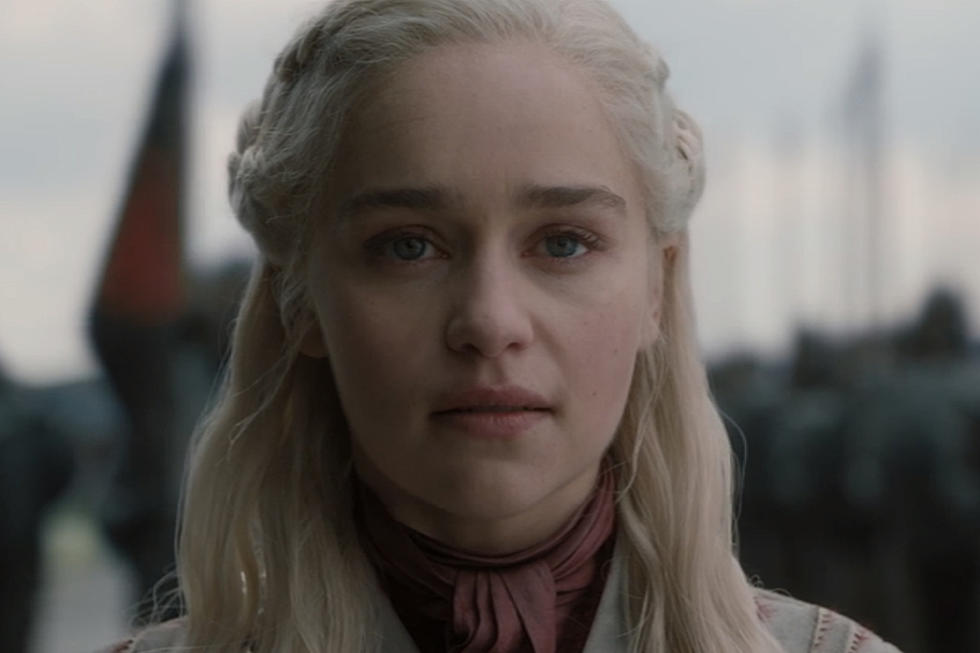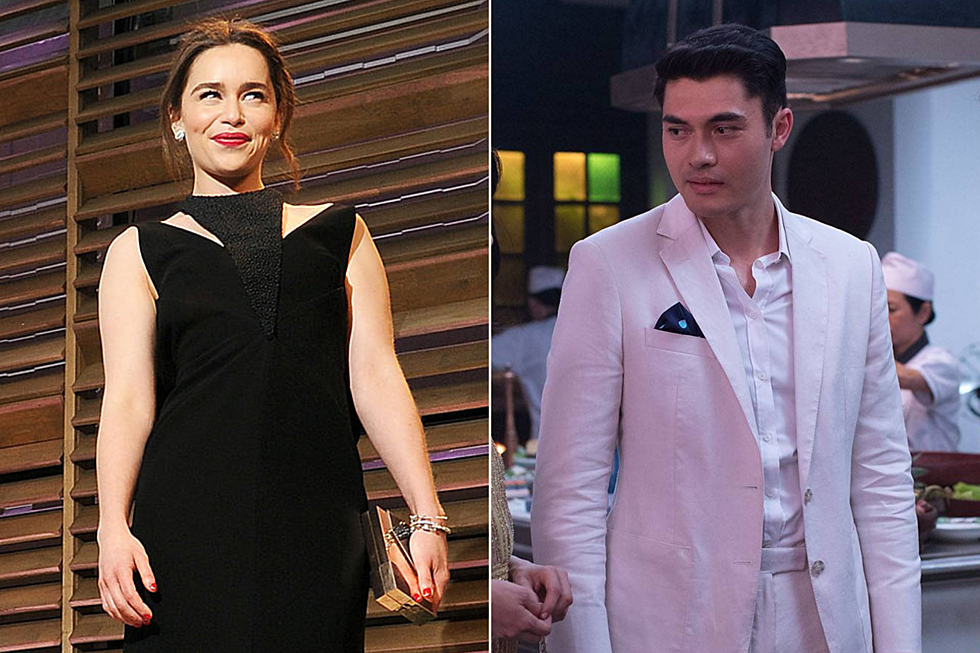
Last Christmas Is a Towering Tribute to How Absolutely Insane Rom-Coms Are
The following post contains SPOILERS for Last Christmas. If you wish to continue to believe in the true power of love, do not read further without seeing the film.
Look at that couple in the picture above. Don’t they look happy? That’s Kate on the left and Tom on the right. They’re the two halves of the romance in the new film Last Christmas. Here they’re sharing an intimate moment on a park bench, surrounded by festive lights and the most picturesque coating of fluffy snow imaginable. It’s the perfect atmosphere for love.
But that’s not what’s really going on in this picture.
As I correctly predicted from the moment the film’s trailer dropped, Last Christmas is one giant Yuletide subterfuge. Kate (Emilia Clarke) and Tom (Henry Golding) are not in love — at least not in any real or tangible sense. That’s because Tom is not alive in any real or tangible sense. It turns out Last Christmas is the most literal possible adaptation of the Wham!’s Christmas classic. Last Christmas, Tom died. As an organ donor, he gave his heart to Kate.
Ever since her transplant, Kate’s felt strange and different; not herself. She struggles at work, fails at auditions, and sabotages every one of the friendships that allows her to couch-hop around London and avoid her domineering mother (Emma Thompson). Everything turns around for Kate when she meets Tom. She starts volunteering at a homeless shelter. She stops auditioning and starts hosting her own shows. She reconciles with her family. And she falls head over heels for Tom.
But her perfect new boyfriend — who pops up out of nowhere, disappears for days at a time, avoids most physical intimacy, and always seems to wear the same extremely beige ensemble — is actually a figment of her imagination. Which means that Last Christmas is the story of a woman who heals herself by repeatedly trying to have sex with the ghost of the man whose heart she acquired in a transplant surgery. (In Kate’s defense, Tom is an extremely handsome ghost.)
This sort of thing can only happen in a romantic comedy — or at least it’s only in a rom-com where a woman trying to do the nasty with a ghost can be treated as an important step on the road to recovery and living a more fulfilled life rather than, y’know, evidence of someone having a complete breakdown that should be treated by a licensed mental health professional. In any other genre, this would be a dark story. I can easily imagine this exact premise as a horror movie — where a woman gets a heart transplant and is driven insane by the angry ghost of the man whose organ she now owns. It would also make an effective basis for a supernatural thriller, with a handsome, ingratiating ghost worming its way into an unsuspecting victim’s life through flattery, kind attention, and a fetching khaki wardrobe. Stripped of all that warm Christmas atmosphere, and its soundtrack of bouncy George Michael and Wham! songs, Last Christmas’ plot sounds like a particularly shocking M. Night Shyamalan movie.
And yet, it is not really much of an anomaly in the world of cinematic romance, where bizarre twists and outlandish plot machinations are often used as an essential stop on the road to love. in Kate & Leopold, Meg Ryan falls for a stodgy Duke who travels to the present day from 1876. The ’80s hit Mannequin — about an artist who creates a mannequin, and then falls in love with it when it turns out to be possessed by the spirit of long-dead Egyptian princess — was so popular they even made a sequel, Mannequin Two: On the Move. Tom Hanks owes a lot of his movie career to his breakthrough in Splash, where he tried to get it on with an actual mermaid, played by Daryl Hannah. (That one got a sequel, too. It was called ... Splash, Too.)
Last Christmas isn’t even the first romantic comedy about a relationship between a traumatized human and a wayward ghost killed in a traffic accident with a title inspired by an ’80s pop hit. In Just Like Heaven, Reese Witherspoon’s doctor is killed in a car crash, and then her spirit hovers around her former apartment, which is now occupied by a grieving widower played by Mark Ruffalo.
As far as I’m concerned, the absurdity in these films is not a bug. It’s a feature. The whole point of romantic comedies is to prove the indomitable power of love in ways Huey Lewis could never even have imagined. The greater the obstacle — time, space, even death itself — the more overwhelming the affirmation that love conquers all. Give me a man and the ghost of a pirate looking for the treasure she buried centuries earlier over a tepid meet cute every day of the week. (Also, please call this ghost pirate rom-com I just made up Pirate’s Booty.) Realism, especially in romantic comedies, is overrated. If I want realistic romantic tales, I’ll read the wedding announcements in the paper. If I want ROMANCE — all caps, italics, with fireworks going off in the background — I’ll watch a rom-com.
Gallery — The Best Comedy Posters Ever:
More From Alt 101.7










